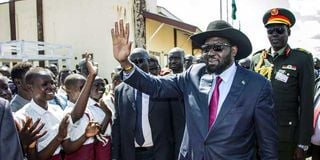Who is afraid of reporting news of leader wetting himself on live TV?

South Sudan’s President Salva Kiir at Juba International Airport, in Juba, in 2018, after returning from peace talks with then-opposition leader Dr Riek Machar in Addis Ababa, Ethiopia.
The Nation, not surprisingly, didn’t report the embarrassing news of South Sudan President Salva Kiir wetting himself on live television.
The video, by the South Sudan Broadcasting Corporation (SSBC), was not aired in South Sudan either. The urinary incontinence occurred last year on December 13 while he was commissioning a new road.
As the national anthem was played at the ceremony, the 71-year-old Kiir was seen urinating in his pants.
The cameraman, realising a presidential humiliating moment was unfolding, shifted focus away from the president. But the video went viral on social media.
There were perfectly good ethical reasons for the Nation not to report the humiliating moment. In any case, urinary incontinence is a medical condition. What President Kiir needed was empathy and medical treatment, not “breaking news” treatment.
Journalism ethics require media to minimise harm. Reporting the urination episode had the potential to shame and harm the man, his family and the presidency. Yet, the story had no redeeming social—maybe not even political—value.
Stories are reported for a purpose. What could have been the purpose of reporting that President Kiir urinated on himself? To suggest to viewers that he is too old and sickly and, therefore, unfit to rule? Or to satisfy the morbid curiosity of viewers and readers?
The Nation did the right ethical thing by not reporting the episode. However, because the video circulated in social media and went viral and, last week, the Juba government arrested six SSBC journalists suspected of having leaked the video, the case for not reporting the urination episode evaporated.
Legitimate and ethical reason
The story could no longer go unreported. The media then, all over the world, acquired a legitimate and ethical reason to report the story. And they did so, again not surprisingly, with enthusiasm and gusto.
The Nation, however, remained prudish; it tiptoed on the story and refused to go the whole hog. It seems to have decided firmly that reporting the contents of the video was a case of feeding the morbid curiosity of viewers and readers. Therefore, it didn’t give the details of the content of the video.
Thus on January 7 Nation.Africa published a story headlined “6 journalists detained in South Sudan over viral video of President Kiir”. But the story didn’t say what other media were saying—that the video shows President Kiir peeing in his pants.
The following day, the Sunday Nation, of January 8, published another story: “Six journalists arrested for ‘demeaning’ Kiir”. This story also didn’t mention that the offending video showed President Kiir urinating on himself (which was the heart of the matter).
Then on Monday, January 9, the Daily Nation published another story, headlined “South Sudan journalists detained over viral Kiir video”. The story prudishly added a meagre detail that the video showed President Kiir “with a wet substance staining his left trouser leg”. Whatever that was!
Echoing the feelings of many readers, Githuku Mungai noted: “A reader who did not check [the video] on YouTube would not know what the small matter was.”
Actually, to report, or not, a president urinating on himself in public is not a “small matter”. It goes to the heart of journalistic ethics and professionalism. In such embarrassing and delicate situations, journalists balance the public right to know and the privacy rights, and dignity, of the president.
In this case, it boils down to this: Does the publication of the story do more harm than good or vice versa? Is there a legitimate public interest in publishing the story? Or is it merely to satisfy prurient or morbid curiosity?
The Media Council of Kenya commented on the coverage (See “President wets himself on live TV, do you cut broadcast?”— Media Review, December 20, 2022). “How the president appears and conducts himself in public is a matter strictly for his family and official handlers, not the media or anybody else,” the weekly publication said. “But should the news be reported? Of course, yes. The world cannot ‘unsee’ what occurred on live TV.”
The Media Council, I agree, should have the last word.
***
Media failed in Galana Kulalu
I have concerns about the last paragraph in John Kamau’s “How crooked profiteers took Galana Kulalu project down the drain” (Daily Nation, Jan. 9, 2023): “We are once again back to Galana Kulalu as William Ruto tries to rescue the project from the drain—where they put it. We can only sit back and watch.” The scheme failed because of the media shirking its public watchdog role. In essence, Nation Media Group is an accomplice in the scam since it didn’t watchdog.
— Anthony Njeru
* * *
Media enablers of the land con
Two contrasting stories: “How Kiambu investor of Lesedi Developers made Sh1 billion by selling hope, hot air” (Daily Nation, Jan. 11, 2023) and “How I grew my real estate firm without taking loans” (Business Daily, Dec. 21, 2021). Both stories refer to Geoffrey Kiragu. Obviously, the BD was one of the enablers of the conman in defrauding his victims. But in citing those who enabled the conman, the Daily Nation doesn’t make reference to its sister publication as one of the enablers. It should have cited all the enablers.
— Gilbert Muyumbu
* * *
Publicising the top performers
Prior to the release of KCPE results, the President and senior education officials agreed not to publicise top-performing schools and students. Their reasoning was that elementary education had been commoditised into a competition and this had negative effects like cheating, rote-learning, sidelining of weaker students, etc.
However, the Nation and other media publicised the top performers. I expected the media to do a more holistic analysis of the exams—such as what the average grades were, the trend of performance over the years, the performance of children from marginalised areas, etc.
— Kinyua Thuku
* * *
Columnist was wrong on Raila
In his column last Sunday, Irungu Kang’ata said about Raila Odinga: “His meetings attract thousands of enthusiastic supporters but he has never won any election”(“Fake ‘ground’ support and hired crowds”, Daily Nation, Jan. 8, 2023).
Raila has won elections—thrice as Langata MP. But since “Wa Barua” is an intelligent man and good writer, I’ll give him the benefit of the doubt and say he meant presidential elections.
— Githuku Mungai
The Public Editor is an independent news ombudsman who handles readers’ complaints on editorial matters including accuracy and journalistic standards. Email: [email protected]. Call or text 0721989264





